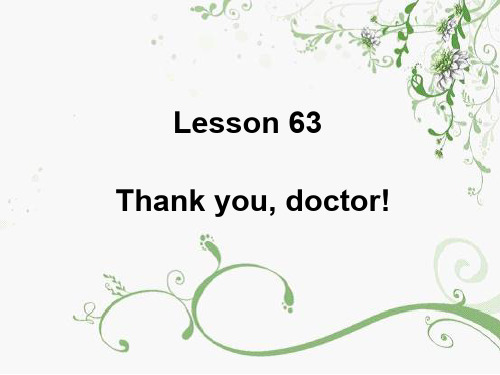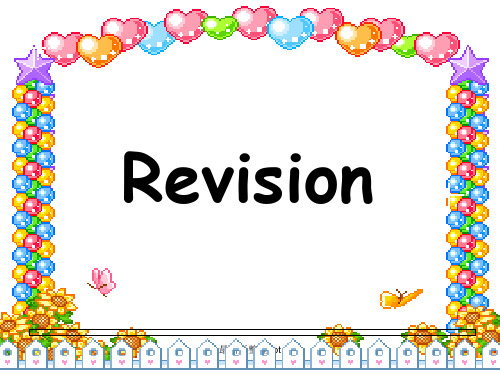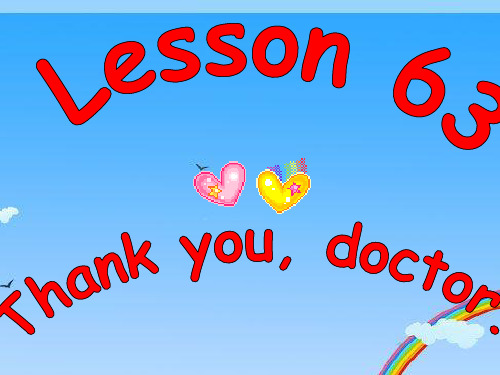新概念第一册63课课件
合集下载
新概念第一册63-64课课件

Can I see your ID card?” ( Tina asked) “Certainly not.” sure主观上的有把握 I’m sure you will be successful in the future. certain确定的(客观上的确定) It is certain that young man will be successful
• ★get up 起床 明天请五点起床。 Please get up at five tomorrow.
• get vt.获得;收到;理解 get a promotion得到晋升
• Do you get me? • 你明白我的意思了吗? • I got you. • 我懂你的意思。
你在哪整的那个扳手?
Most people remained silent at the meeting. 大多数人在会议上保持沉默。
Learn the text
课文讲解
• Must 是一个表达的情感很强烈的情态动词 意思是必须,应当=have to Must I go there? Yes, you must. No, you need not.
As a ________, you must ________. student, teacher, driver, doctor,
Must _________ ?
• Yes/No question 一般疑问句
Mike has a cold, must he see a doctor? I want to go to the USA, must I get a passport? It’s very hot today, must I go to school?
• ★get up 起床 明天请五点起床。 Please get up at five tomorrow.
• get vt.获得;收到;理解 get a promotion得到晋升
• Do you get me? • 你明白我的意思了吗? • I got you. • 我懂你的意思。
你在哪整的那个扳手?
Most people remained silent at the meeting. 大多数人在会议上保持沉默。
Learn the text
课文讲解
• Must 是一个表达的情感很强烈的情态动词 意思是必须,应当=have to Must I go there? Yes, you must. No, you need not.
As a ________, you must ________. student, teacher, driver, doctor,
Must _________ ?
• Yes/No question 一般疑问句
Mike has a cold, must he see a doctor? I want to go to the USA, must I get a passport? It’s very hot today, must I go to school?
新概念第一册63-64课课件

对划线部分提问
Andrew has some brothers and sisters. Does Andrew have _____ _____ any brothers or ___sisters? (变一般疑问句)
Oral practice
If you are sick(stomachache,headache,earache,tootha che,etc.),the doctor is seeing you. Make a dialogue with your partner at least 2 minutes
2. Jimmy has a bad cold. (变为一般疑问句) Does Jimmy ______ have a bad cold? _____ Yes, ____ he ____. does
3. We must keep the room warm. (提问) What _____ must you _______? do _____
•
What must she do ?. ?. ?
Lesson 63 Thank you, doctor!
Learn the text
Listen and answer
Mr. Williams is in bed.Because he has a bad cold.
Who else is in bed today? Why?
单词学习
• • • • • • • better certainly get up yet rich food remain adj. 形容词well的比较级 adv. 当然 起床 adv. 还,仍 adj. 油腻的,富有的 n. 食物 v. 保持,继续
新概念第一册63课 PPT课件

days.
• He can get up for about two hours each day, but you must keep the room warm.
• D:Where's Mr. Williams this evening?
• W:He's in bed, doctor. Can you see him please? He has a bad cold, too!
•
课文讲解
• How is Jimmy today? 吉米今天怎么样了? how 特殊疑问词,怎样 你怎么样?(你好吗?)How are you? 你有多重?How heavy are you? 你感觉如何?How do you feel today?
Modal verb
• Must 是一个表达的情感很强烈的情态动词意思是必须, 应当=have to
• every student (不能写为every of the student) • Every one of my fingers • Every boy loves their school. • Every one works hard in our company.
• Keep sth… Please keep your desk tidy.保持桌面整洁。 Keep the room warm.保持房间温暖。
Completing the text
• D:How's Jimmy today? • W:Better. Thank you,doctor. • D:Can I see him please, Mrs. Williams? • W:Certainly, doctor. Come upstairs. • D:You look very well, Jimmy. • You are better now, but you mustn' t get
• He can get up for about two hours each day, but you must keep the room warm.
• D:Where's Mr. Williams this evening?
• W:He's in bed, doctor. Can you see him please? He has a bad cold, too!
•
课文讲解
• How is Jimmy today? 吉米今天怎么样了? how 特殊疑问词,怎样 你怎么样?(你好吗?)How are you? 你有多重?How heavy are you? 你感觉如何?How do you feel today?
Modal verb
• Must 是一个表达的情感很强烈的情态动词意思是必须, 应当=have to
• every student (不能写为every of the student) • Every one of my fingers • Every boy loves their school. • Every one works hard in our company.
• Keep sth… Please keep your desk tidy.保持桌面整洁。 Keep the room warm.保持房间温暖。
Completing the text
• D:How's Jimmy today? • W:Better. Thank you,doctor. • D:Can I see him please, Mrs. Williams? • W:Certainly, doctor. Come upstairs. • D:You look very well, Jimmy. • You are better now, but you mustn' t get
新概念英语第一册63-64课最新版ppt课件

28
1. Is Jimmy better now?
2. How long can he get up?
3. Can he go to school today?
4. What mustn't he eat?
5. What must Mrs. Williams do?
最新版整理ppt
29
最新版整理ppt
最新版整理ppt
54
Don’t…
不准...不要...
You mustn’t…不可以…不应该...
Don’t read in bed. You mustn’t read in bed.
最新版整理ppt
55
Play:play with sb. 和某人玩
• Eg:I want to play with Jim.
最新版整理ppt
51
The boy mustn’t _g_o___ to
school yet, Mrs. Williams.
And he mustn’t eat __r_ic_h_
_f_oo_d__.
Does he _h_a_v_e__ a
temperature, doctor?
No, he _d_o_e_sn_’_t .
but you _m__u_st__ keep the
room warm.
最新版整理ppt
53
_W__h_er_e_’s Mr. Williams
this evening? He’s _i_n_ __b_ed__, doctor. _C_a_n__ you see him please? He __h_as__ a bad cold, too!
• 否定句:must not 缩写:mustn’t
【精品】新概念英语第一册-Lesson-63-64教学课件

他又犯了一个错误。
rich
• rich adj. 油腻的,富有的 the rich 富人 the poor 穷人
我不喜欢黄油因为它太腻了。
I don’t like butter, because it is too rich.
food
• 当food作“食物,粮食”解时,均用作不可数名 词
eg. food and drink 饮食 我们去买些食物吧。 Let’s go to buy some food.
我可以看看他吗,威廉斯夫人?
• see 探望 see sb 看望某人
课文详解
• but you mustn’t get up yet.
但你还不应该起床。
• must 一定 情态动词 • mustn’t 不准,不可以
课文详解
• …stay in bed for another two days
再卧床两天
5. What must Mrs. Williams do? Keep the room warm.
课文详解
• How is Jimmy today? 吉米今天怎么样了?
• how询问身体状况
你好吗? eg. How are you?
课文详解
• Can I see him please,Mrs. Williams?
• make a noise
• 不要制造噪音,否则我们饶不了你。
• Don't make a noise or we'll kill you.
take the aspirins 服用阿司匹林
play with matches 玩火柴
talk in the library 在图书馆里讲话
make a noise 弄出噪音
rich
• rich adj. 油腻的,富有的 the rich 富人 the poor 穷人
我不喜欢黄油因为它太腻了。
I don’t like butter, because it is too rich.
food
• 当food作“食物,粮食”解时,均用作不可数名 词
eg. food and drink 饮食 我们去买些食物吧。 Let’s go to buy some food.
我可以看看他吗,威廉斯夫人?
• see 探望 see sb 看望某人
课文详解
• but you mustn’t get up yet.
但你还不应该起床。
• must 一定 情态动词 • mustn’t 不准,不可以
课文详解
• …stay in bed for another two days
再卧床两天
5. What must Mrs. Williams do? Keep the room warm.
课文详解
• How is Jimmy today? 吉米今天怎么样了?
• how询问身体状况
你好吗? eg. How are you?
课文详解
• Can I see him please,Mrs. Williams?
• make a noise
• 不要制造噪音,否则我们饶不了你。
• Don't make a noise or we'll kill you.
take the aspirins 服用阿司匹林
play with matches 玩火柴
talk in the library 在图书馆里讲话
make a noise 弄出噪音
新概念英语一册第63-64PPT课件

10
Which is rich food, which is not?
11
• food • 食物(不可数)
12
• remain • 保持,继续
13
remain what?
14
Language point
he’s better = he is better Come upstairs
❤如果是离开说话者,用go! go upstairs (上
don’t & mustn’t (都可以用来表示禁令) ↓
语气较强烈 例:Don’t take this medicine.
You mustn’t take this medicine.
23
Grammar
• 反身代词o(≧v≦)o ❤ myself. yourself. herself. himself.~~
• She has an earache. • ...?
• They go to school.
• ...?
3
找错误
• He can swimming.
• Jack must cleans the Woman's washroom.
• Does Tina's baby must go to bed?
1)当宾语和主语是同一人的时候^^ Lucy is talking to herself. Enjoy yourself in the birthday party!
2)可以与名次连用,表示”就是那个人而不是别人“ 的意思^^ we went there ourselves(我们自己去那儿了) They wanted to finish the work themselves. (他们想靠自己来完成这项工作)
Which is rich food, which is not?
11
• food • 食物(不可数)
12
• remain • 保持,继续
13
remain what?
14
Language point
he’s better = he is better Come upstairs
❤如果是离开说话者,用go! go upstairs (上
don’t & mustn’t (都可以用来表示禁令) ↓
语气较强烈 例:Don’t take this medicine.
You mustn’t take this medicine.
23
Grammar
• 反身代词o(≧v≦)o ❤ myself. yourself. herself. himself.~~
• She has an earache. • ...?
• They go to school.
• ...?
3
找错误
• He can swimming.
• Jack must cleans the Woman's washroom.
• Does Tina's baby must go to bed?
1)当宾语和主语是同一人的时候^^ Lucy is talking to herself. Enjoy yourself in the birthday party!
2)可以与名次连用,表示”就是那个人而不是别人“ 的意思^^ we went there ourselves(我们自己去那儿了) They wanted to finish the work themselves. (他们想靠自己来完成这项工作)
新概念英语第一册(全套)Lesson63-64ppt

up yet. 你现在好些了,但你还不应该起床。
two days.
• stay in bed=remain in bed卧床
• 不,他不发烧了。 • 他还必须卧床吗? • 是的,他还必须卧床两天。
• He can get up for about two hours each day, but you must keep the room warm.
• mustn't是must的否定式,表示不能…… • yet用于否定句句末,仍然 • stay in bed,卧床 • for表示时间的持续,another,另外…
• 但你还不应该起床。你必须再卧床两天。
• The boy mustn't go to school yet, Mr. Williams.And he mustn't eat rich food.
• Does he have a temperature, doctor?
• go to school去上学 • have a temperature发烧
• 这孩子还不能去上学,威廉斯夫人,而且 不能吃油腻的食物。
• 他还发烧吗,医生?源自• No, he doesn't. • Must he stay in bed? • Yes.He must remain in bed for another
★注意:最高级前要加定冠词the
★certainly adv. 当然 =Of course. =Sure.
eg:May I come in? Certainly./Of course./Sure. 我能进来吗? 当然可以。
★get up 起床
eg:Please get up at five tomorrow. 明天请五点起床。
two days.
• stay in bed=remain in bed卧床
• 不,他不发烧了。 • 他还必须卧床吗? • 是的,他还必须卧床两天。
• He can get up for about two hours each day, but you must keep the room warm.
• mustn't是must的否定式,表示不能…… • yet用于否定句句末,仍然 • stay in bed,卧床 • for表示时间的持续,another,另外…
• 但你还不应该起床。你必须再卧床两天。
• The boy mustn't go to school yet, Mr. Williams.And he mustn't eat rich food.
• Does he have a temperature, doctor?
• go to school去上学 • have a temperature发烧
• 这孩子还不能去上学,威廉斯夫人,而且 不能吃油腻的食物。
• 他还发烧吗,医生?源自• No, he doesn't. • Must he stay in bed? • Yes.He must remain in bed for another
★注意:最高级前要加定冠词the
★certainly adv. 当然 =Of course. =Sure.
eg:May I come in? Certainly./Of course./Sure. 我能进来吗? 当然可以。
★get up 起床
eg:Please get up at five tomorrow. 明天请五点起床。
新概念英语第一册第63-64课课件

Language point
he’s better = he is better Come upstairs ❤如果是离开说话者,用go! go upstairs (上
楼。说话者站在楼梯下部) 如果是靠近说或者, 用come!come upstairs (上楼。说话者站在楼 梯上部)
yet. 在现在完成时的句子中,already常用于肯
• 单词抄三译一 • 家长单词听写并且签字 • 背诵63课课文
Lesson 64
Words
• Play 玩 So 如此地 • Match 火柴 Quickly 快地 • Talk 谈话 Lean out of 身体探出 • Library 图书馆 Break 打破 • Drive 开车 Noise 喧嚣声
• each day = everyday 每天 • keep the room warm 使房间保持温暖
• 例句:冬天来了,我们必须每天都使房间保持温 暖。 • Winter is coming, we must keep the room warm each day(everyday).
作业
tell着重指告诉。 tell sb. sth=tell sth to sb 告诉某人某事 例:告诉我你的名字。 tell me your name. say着重指说,强调说话。 例:玛丽说她很富有。 Mary says she is rich。 speak有讲说,演讲等含义,或强调说的语言。 例:小明不会说法语 但是会说英语。 Xiaoming can not speak French,but he can speak English. talk指交谈,谈论谋事。 例:他们正在讨论学校图书馆 They are talking about school
新概念英语一册第63-64课课件

get up
[get ]
起床
yet
rich
food remain
[jet]
[ritʃ ]
[fud] [rɪ'main]
还,仍 油腻的 食物 保持,继续
[‘betə]
['sɜːt(ə)nlɪ]
[get ] [jet]
[ritʃ ]
[fud] [rɪ'main]
Well的比较级
当然 起床 还,仍 油腻的 食物 保持,继续
This is a match.
You mustn’t _t_al_k l_ou_d_ly. = Don’t _t_al_k _lo_ud_ly.
• This is the library .
• Talk?
You mustn’t ____.= Don’t ______.
drive [ draiv ] so [ səu] quickly [ 'kwikli ]
jumping
laughingLeabharlann grammar情态动词
can 能,会 (表示有能力做某事) must 必须 (表示应该做某事)
e.g. She can swim. She must swim.
must
must用法很简单, 没有人称没有数, 动词原形跟在后, 肯定变否定,must + not, 一般疑问句,must 要提前, 肯定回答 must, 否定回答 needn’t。
don’t & mustn’t (都可以用来表示禁令) ↓
语气较强烈
例:Don’t take this medicine. You mustn’t take this medicine.
- 1、下载文档前请自行甄别文档内容的完整性,平台不提供额外的编辑、内容补充、找答案等附加服务。
- 2、"仅部分预览"的文档,不可在线预览部分如存在完整性等问题,可反馈申请退款(可完整预览的文档不适用该条件!)。
- 3、如文档侵犯您的权益,请联系客服反馈,我们会尽快为您处理(人工客服工作时间:9:00-18:30)。
3. Do you have an extra pen? Mine broken. Can you lend your pen to me? Could you lend me your pen? I can’t find mine. 4. Could you do me a favor? Can you help me? Please give me a hand. * do sb a favor 帮某人忙
• had better do sth. 最好做某事 • had better not do sth. 最好不要做 某事 你最好带副手套 你最好不要在课堂上打电话。 You had better wear a pair of gloves. You had better not telephone in the class.
5. I’ll be glad to help. I’m happy to help. It’s my pleasure to help. * be glad/happy to do sth 乐意做…… 6. If you need any help, let me know. You can rely on me for help. You can come here if you have any problems. * rely on 依赖,相信
口语练习
• 看图说话
作业
• 背诵专业词汇表第二页中的所有单词, 并使用其中的一些词汇造10个句子, 每个句子不得少于5个单词。 • 背诵本课课文,以及日常用语中的所 有例句。 • 两人一组,根据日常用语的例句,进 行练习,并模拟场景,下一堂课进行 表演,要求与工作有关,并脱稿。
2. Every 指三个或三个以上的每一个。 它只能做形容词 • every student (不能写为every of the student) • Every one of my fingers • Every boy loves their school. • Every one works hard in our company.
(典型对话)
A: Do you know what’s wrong with the printer? B: Let me see. I think it ran out of paper. A: I’ll get some. Thanks. B: With pleasure. * printer 打印机 run out of 用光
• Keep sth… Please keep your desk tidy. • Keep v.保持, 保留, 继续, 贮藏, 耽搁 把它保存在阴暗凉爽的地方。 Keep it in a dark and cool place. Keep going. 这孩子一直哭。 我不会耽误你太长时间。 The child kept crying. I won't keep you long.
• ★get up 起床 明天请五点起床。 Please get up at five tomorrow. • Get vt.获得;收到;理解 Get a promotion Do you get me?. 你在哪整的那个扳子? I got you. 你能给我买张票吗? Where did you get that spanner? Will you get me a ticket?
A: What’s wrong? B: This machine doesn’t work. Can you help me? A: I wish I could help you, but I’m busy now. You can ask Tom for help. B: OK B: Can I ask you a favor, Tom? C: Sure. B: This machine doesn’t work. C: Let me take a look at it.
练习
• 做书面练习A和B,并进行翻译。 • 想像如果你生病了(胃疼、头疼、耳 朵疼、牙疼、眼睛疼、腿疼、脚疼、 胳膊疼等等)医生来探望你。 根据此情景与自己的同伴做一个不少 于2分钟的对话。
日常用语
• 帮忙 (一)典型句型 1.Do you know what’s wrong with the…? ……怎么了?出什么问题了? What’s wrong with you? 出什么事了?你怎么了? 2. Are you OK/fine there? Everything is fine.
7. I wish I could help you, but I’m busy now. There is really no way I can do it. Sorry, I can’t help you. 8. I’m sure Jim will help.(否定句) I think everyone could help you. You’d better rely on yourself. * be sure 确定 rely on 依靠
A: What’s up? B: There is so much work to do. I’m crazy. A: Need a help? B: Thanks. I don’t want to trouble you. A: OK. Take care of yourself.
* take care of oneself 照顾某人自己
• Better late than never. • Better safe than sorry. I am your friend, so for better for worse, I will always be with you ,I will always be on your side.
课文讲解
• How is Jimmy today? 还记得怎么回答吗? • Must 是一个表达的情感很强烈的情态动词 意思是必须,应当=have to Must I go there? Yes, you must. No, you need not. 我们必须按时交付货物。 We must deliver the goods on time.
★better adj. 形容词well的比较级 Good/well —> better —> best 1. 什么是比较级? 将一个人或物与另一个比较,就用比较级 2. 比较级的构成 单音节 多音节 不规则
比较等级变化规律口诀
•
比较级要变化,一般词尾加
重读闭音节,单个辅音字母要双写。 辅音字母加y,要把y改i。 最高级加-est,前面加the莫忘记。 形容词若是多音节,只把more, most前面写。
Lesson 63 Thank you, doctor!
本课内容
• • • • • • 单词学习 课文讲解 练习 日常用语 口语练习 作业
单词学习
• • • • • • • better certainly get up yet rich food remain adj. 形容词well的比较级 adv. 当然 起床 adv. 还,仍 adj. 油腻的,富有的 n. 食物 v. 保持,继续
★remain v. 保持,继续 ① v. 留下;停留 你最好留在家里。 我们将要在罗马再呆两天。 You’d better remain at home. We’re going to remain in Rome for another two days.
② v. 保持不变 在几天内还会很冷。 大多数人在会议上保持沉默。 It will remain cold for a couple of days. Most people remained silent at the meeting.
• each和every的区别: 1.Each 指两个或两个以上中的每一个 它有两种词性:形容词起修饰限定作用, 代词可单独使用。 • each boy <adj. > • each of the boys <pron.> • each of my hands • each of my parents • each of the students
A: Do you need any help? B: Sure, if you don’t mind. A: Of course I don’t mind. B: Can you help me print this? A: OK. B: Thank you. A: If you need any help, let me know.
9. Do you need any help? Do you want any help? Need a hand? 回答可以是: No, thanks. I don’t need a hand. I can do it on my own. I don’t want to trouble you. * Sorry for troubling you.
• ★yet adv. 还,仍(多用于否定句中) The work is not finished yet.(反义句) • ★certainly adv. 当然 =Of cause. =Sure. • ★rich adj. 油腻的,富有的 the rich 富人 the poor 穷人 我不喜欢黄油因为它太腻了。 I don’t like butter, because it is too rich.
